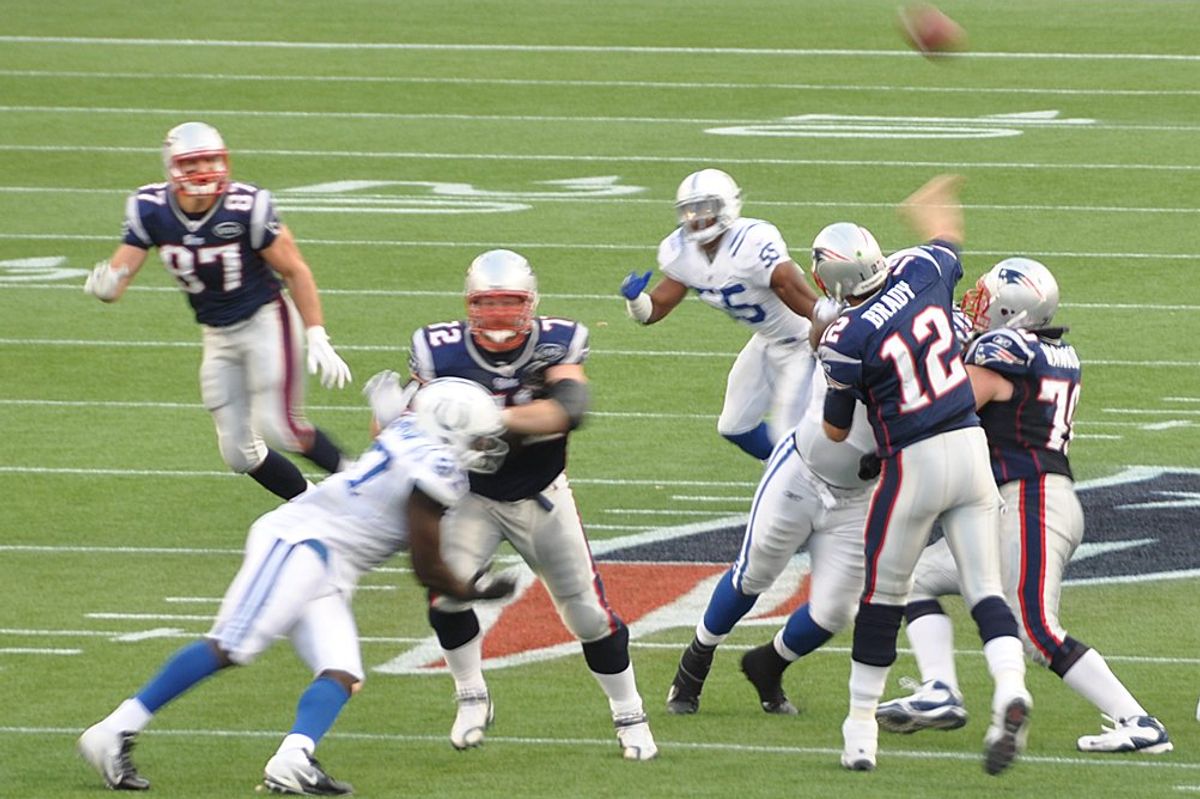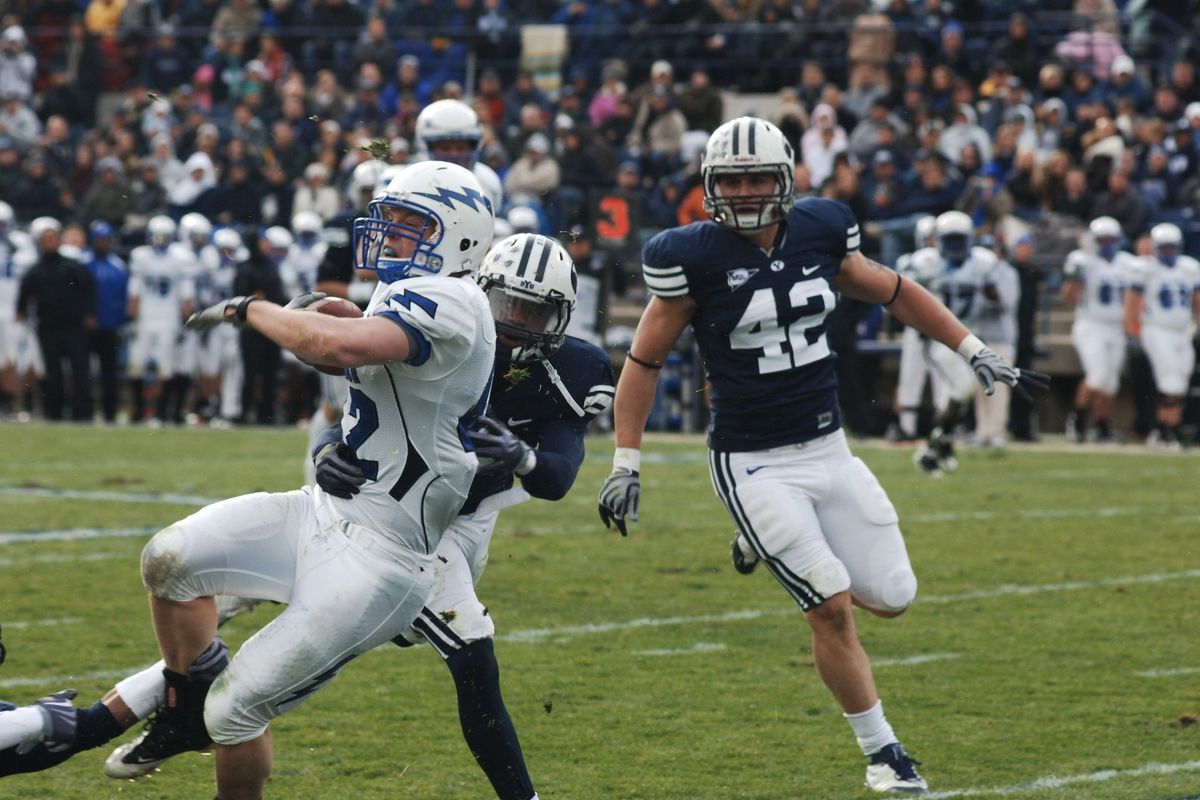Colts tight end Kylen Granson explains he wants to set good example with the ‘Guardian Cap’
“You’re not soft for wearing one.”

Colts Kylen Granson explains why he wears guardian cap
One of the big concerns about American football is head-to-head contact. Even though the players are wearing helmets, slamming into another players helmet or being thrown to the ground during a play can cause significant trauma to the brain. While the NFL has banned helmet-to-helmet contact out of safety concerns, it can still happen and nothing can stop a player's head from contacting the hard astroturf or grass covered field.
Hits to the head whether it's from another helmet or from being tackled can cause concussions which not only inhibit the player from continuing in the game but can cause the player to develop a condition called Chronic Traumatic Encephalopathy (CTE). According to Indiana University School of Medicine, "CTE is a progressive degenerative disease affecting people who have suffered repeated concussions and traumatic brain injuries, that may occur in some athletes and others who have been exposed to concussions and repetitive head impacts."
That's where the "Guardian Cap" comes in.
The padded cap slips over the hard shell of a football helmet to add additional padding to the players head in hopes to reduce traumatic brain events caused by contact during football.
More high schools have been interested in using the caps after the tragic deaths of students who sustained head injuries while playing football.
The caps have made their way to the NFL as optional use but Colts tight end Kylen Granson is determined to set a good example for his peers, youth and his future children. The tight end took to social media to explain why he still planned to wear his Guardian Cap during the regular season though the NFL made it optional.
"This is a Guardian Cap. All it is, is essentially a little extra padding on the exterior of the helmet. This was something that was first introduced last year and most of the offensive line, defensive line were mandated to wear it during practice," Granson explains before adding that other positions had the option to keep wearing it.

The professional football player says it was essentially an experiment to see if the caps actually reduced concussion rates, finding that it reduced the rates significantly.
Since the reduction in concussion incidents was so steep, the players were mandated to wear them during training camp with the option to wear them during the preseason games, which Granson and a few others did. After the success of the reduction in concussions during training camp and preseason, the NFL gave players the option to wear them during regular season according to the tight end.

"For me it was a no brainer. I just said, 'yes I want to wear it the whole season.' I've never really had a problem with the Guardian Caps, they don't really limit vision. They don't add any extra weight that's noticeable. Why would I not add a safety measure onto my helmet," Granson asks.
He further explains that any thing that adds safety for him as the player, especially when it comes to mitigating long term effects takes precedent for him.
Granson shares that he also believes "that it's part of my duty to advocate for my own health and safety and try to encourage others to also make the choice to continue wearing these.
There's no amount of aesthetic that can outweigh what a TBI (traumatic brain injury) could do to you."

While the player goes on to explain the small hits add up, comparing the human brain to "a jello inside of your head," he's also taking this safety measure to be an example to younger players and his future children.
"As someone who wants to have kids someday, I want them to also know, hey dad isn't just telling you to be safe, he also is safe when he played. He did everything that he could to protect his head, to protect his brain, to protect his longterm health. I want to inspire kids to think that health and safety is also cool. You can do cool things out on the football field and still wear a Guardian Cap," Granson expresses that it goes beyond the football field to include children wearing bicycle helmets. "There would be no amount of cool that would be worth walking into a hospital room and your child is in a vegetative state because they weren't wearing a helmet. Because they didn't look dumb."

The heartfelt, well thought out message was well received with commenters praising Granson for continuing to wear the Guardian Cap and speaking about his reasonings online. Fans and professionals alike came to support the player in his comments.
"As a fan, if it keeps your team's star player on the field instead of on concussion protocol why wouldn't you want them wearing it," one person questions.
"As a speech therapist who has worked with traumatic brain injuries, I was happy to see the guardian caps! Thanks for speaking on this," another writes.
@thekcg83 You’re not soft for wearing one the hits are just as hard you’re just minimizing the repercussions of those hits. ##nfl##nflfootball##nfltok##nflnews##nfltiktok##sportsnews##guardiancap##guardiancaps##colts##coltstarting##coltsfootball##coltsnation##coltsoftiktok
"Fans will come around. Everyone hated the the F1 Halo until it started literally saving lives and now we're all down. We fans can be a little slow but we'll get there," a different commenter reminds others.
"I want you to remember that you helped put a new practice into place without stigma to help other players be safer and do what they love longer," one woman shares while another commenter says, "I'm a TBI researcher. Thank you for advocating for things like this that will increase player safety."
It may take a little longer for the entire league to either opt to wear them or be mandated to wear the caps, but Granson is making the argument simple. Wear the Guardian Cap–increases safety.

